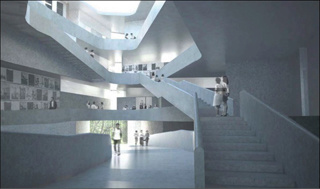A February milestone. An injection of suspense in June. And a moment of praise (and a chance to exhale) in October. This sequence provides a snapshot of the progress made in 2012 with regard to the replacement of flood-damaged arts facilities at the University of Iowa.
UI President Sally Mason spoke glowingly when describing development of design concepts for new facilities that will replace Hancher Auditorium, Voxman School of Music/Clapp Recital Hall, and the 1930s-era Art Building.
The Iowa Board of Regents approved the concepts Feb. 7. That evening, Rod Lehnertz, UI director of planning, design, and construction, and architects for the arts projects unveiled initial plans to a packed public forum.

Per the plans, Hancher would be constructed north of the present building, at least two feet above the 500-year flood plain. Scheduled for completion in December 2015, the facility would feature a three-level lobby with dramatic views of Iowa River and campus; a 1,950-seat auditorium with two balconies; separate rehearsal space suitable for programming; and a design in scale with the neighboring Levitt Center for University Advancement.
The Voxman School of Music would be located in downtown Iowa City, with its main entrance at the intersection of Burlington and Clinton streets. The structure would feature a largely glass exterior and second-floor auditoriums; substantial completion was projected for August 2016.

The new Art Building will be located just northwest of Art Building West, at least two feet above the 500-year flood plain. Its structure is designed for maximum natural light, and would boast potential green features such as radiant heat and perforated exterior panels that control light and heat. Substantial completion for the Art Building was projected for April 2016.
Another challenge to overcome
The moments of suspense came when the Office of Inspector General (OIG)—an audit organization within the U.S. Department of Homeland Security, which also includes the Federal Emergency Management Agency (FEMA)—found fault with FEMA'sreplacement determinations and approvals for the university’s flood-damagedHancher, School of Music, and studio art buildings.
Art Building West back in business
After three and a half years of dormancy, Art Building West returned to service in the spring semester of 2012. A variety of classes, including painting, photography, graphic design, and art history, return to Art Building West for the first time since the flood in the summer of 2008. Click here for a brief look at life returning to the building.
The OIG on June 28 released a report on FEMA’s decisions to replace rather than repair buildings at the UI. The organization recommended that replacement project funding commitments for Hancher/Voxman-Clapp and Art Building be reversed based upon its interpretation of FEMA’s internal policies for replacing damaged buildings within a flood plain.
Iowa Gov. Terry Branstad, members of Congress, the Board of Regents, and the Office of Iowa Homeland Security responded with strong support for the UI to persist and complete these critical replacement projects.
“The state of Iowa, the Board of Regents, and the University of Iowa remain committed to expediting a full recovery from the devastating flooding that occurred in the summer of 2008,” said Branstad and Iowa Board of Regents President Craig Lang in a joint statement. “We are frustrated that different interpretations of internal FEMA policies are having real and negative impacts on the University of Iowa’s recovery.
“Although the waters have long receded, the impact of the flood continues to hinder university students,” the statement continued. “A cultural void persists that has impacted tens of thousands of Iowans. We believe the federal government should be held accountable for flood recovery progress, especially as we mark the four-year anniversary of the historic flooding event. Project delays due to differing interpretations of Federal policy four years after the flood are unacceptable, unwelcome, and counterproductive.
“To prevent further recovery delays, we hope that FEMA’s national leadership responds to the OIG report in a matter of weeks, not months. We are now more than four years after this disaster and the University of Iowa, its students, the Iowa City community, and the state cannot afford to put its recovery on hold. We expect FEMA to do the right thing and reaffirm its previous decisions to replace these buildings,” Branstad and Lang concluded.
Mason expressed her gratitude for the various statements of support. “We are optimistic that with such support, FEMA’s national leadership soon will reaffirm its earlier, substantial commitments to these replacement projects, and prevent the university, its students, and the state of Iowa from twice becoming victims of the 2008 floods,” she says.
“After four years, it is unreasonable to expect that these flooded buildings be repaired and used as classrooms, studios, and performance space for our students,” Mason continued. “While we are frustrated, be assured that the university is determined to replace these critical facilities as authorized by our board.”
Clarification comes in autumn
In October, Mason and state and congressional leaders were united in their praise of the federal government’s decision to reaffirm its commitment to provide $83 million for the replacement of the arts buildings.
“The students, faculty, and staff of the University of Iowa are grateful for the strong and continuous support of our congressional delegation, the governor, state legislature, and the Board of Regents,” she says. “This final action on our replacement buildings clears the way for construction, and we are ready. Our students and campus can now move forward with certainty that they will have the facilities they need.”
Branstad and Lt. Gov. Kim Reynolds called settlement of the dispute “long overdue.”
“Department of Homeland Security leaders have reaffirmed FEMA’s previous commitments to the state and the University of Iowa,” Branstad and Reynolds says. “Thankfully, common sense has prevailed. We appreciate the Iowa congressional delegation’s active involvement in this issue and FEMA leadership’s openness to discuss our concerns throughout their policy dispute with the Department of Homeland Security Office of Inspector General.”
